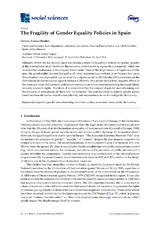Mostrar el registro sencillo del ítem
The Fragility of Gender Equality Policies in Spain
| dc.contributor.author | Salazar Benítez, Octavio | |
| dc.date.accessioned | 2017-11-06T12:14:41Z | |
| dc.date.available | 2017-11-06T12:14:41Z | |
| dc.date.issued | 2016 | |
| dc.identifier.uri | http://hdl.handle.net/10396/15302 | |
| dc.description.abstract | Within the last decade, Spain has become a model in legislative policies for gender equality at the international level. However, the economic crisis has led to a growth in inequality, which has revealed the weaknesses of the adopted instruments. Despite the large amount of legislation in this area, the social reality has not changed at all, even experiencing a setback over the past few years. This situation was exposed in our country by a report issued in 2015 by the UN Committee on the Elimination of Discrimination against Women (CEDAW). This report showed the negative effects of the economic crisis and austerity policies on women, even in a context necessitating increased efforts towards women’s rights. Therefore, it is imperative that the concept of gender mainstreaming and the adoption of instruments of “hard law” be revisited. The goal should be to achieve gender justice based on three elements—distribution, identity, and representation—and a real parity democracy. | es_ES |
| dc.format.mimetype | application/pdf | es_ES |
| dc.language.iso | eng | es_ES |
| dc.publisher | MDPI | es_ES |
| dc.rights | https://creativecommons.org/licenses/by/4.0/ | es_ES |
| dc.source | Social Sciences, 5(2), 17 (2016) | es_ES |
| dc.subject | Equality | es_ES |
| dc.subject | Gender mainstreaming | es_ES |
| dc.subject | Hard law | es_ES |
| dc.subject | Justice | es_ES |
| dc.subject | Economic crisis | es_ES |
| dc.subject | Parity democracy | es_ES |
| dc.title | The Fragility of Gender Equality Policies in Spain | es_ES |
| dc.type | info:eu-repo/semantics/article | es_ES |
| dc.relation.publisherversion | http://dx.doi.org/10.3390/socsci5020017 | es_ES |
| dc.rights.accessRights | info:eu-repo/semantics/openAccess | es_ES |

